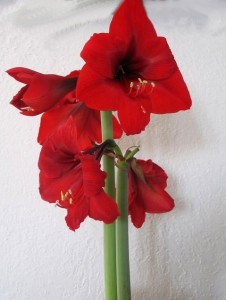by John C. Murray, El Paso Master Gardener
Holiday gift plants brighten the winter months. Following some simple rules for care can help us enjoy these gifts for years to come.Rule #1: Do NOT expose to cold or hot drafts.
Rule #2: Remove sleeves or re-pot as soon as possible. Most Christmas plants are sold in the protective sleeve they are shipped in. These sleeves can hold water and promote root rot.
Tips for favorite plants include:
Amaryllis (Hippeastrum ssp.) – This is considered the easiest to keep alive after the holiday season. After the blossoms wither, cut the flower stem 1-2 inches above the base. Sunlight is essential during the growth stage.
Christmas Cactus (Schlumbergera ssp.)– All varieties require rich, well-drained, preferably acidic soil and bright, indirect light. Feed with a well-balanced houseplant fertilizer between April and October. They are not drought tolerant, and are not cold hardy. Water thoroughly and let dry out between watering. If a stem breaks off, place it in a pot of sandy type soil for an easy new plant. Christmas cactus can be kept potted outside in the summer in an area protected from strong afternoon sun.
Living Christmas Trees – The key to successfully planting a living Christmas tree outdoors is to do so as soon as possible to reduce the chance that the tree might lose its cold temperature hardiness. Make sure you know what specific types of trees (fir, spruce, pines) are available and choose one appropriate for El Paso’s climate.
Norfolk Island Pine (Araucaria helerophylla) – This evergreen tree can be easily maintained, but only as a houseplant in El Paso. The greatest challenge in keeping this tropical plant alive is providing the high humidity it needs.
Poinsettia (Euphorbia pulcherrima) – These do best at 60-70 °F, can be maintained for years, and are not poisonous. If these plants get too cold, they can turn yellow and drop leaves rapidly. Water only when the soil feels dry to the touch. Fertilize after the bloom to encourage growth. Daylight and darkness hours must be managed to foster re-blooming.
Rosemary (Rosmarinus offcinalis) – Most common varieties are hardy and grow year-round outdoors in full El Paso sun. They perform better if watered only when the soil is dry several inches down. Propagate the rosemary plant by taking cuttings of new, green stem growth. Root the cutting by sticking the cut end in a glass with 2 inches of water and plant the cutting in mild weather once roots have formed.
